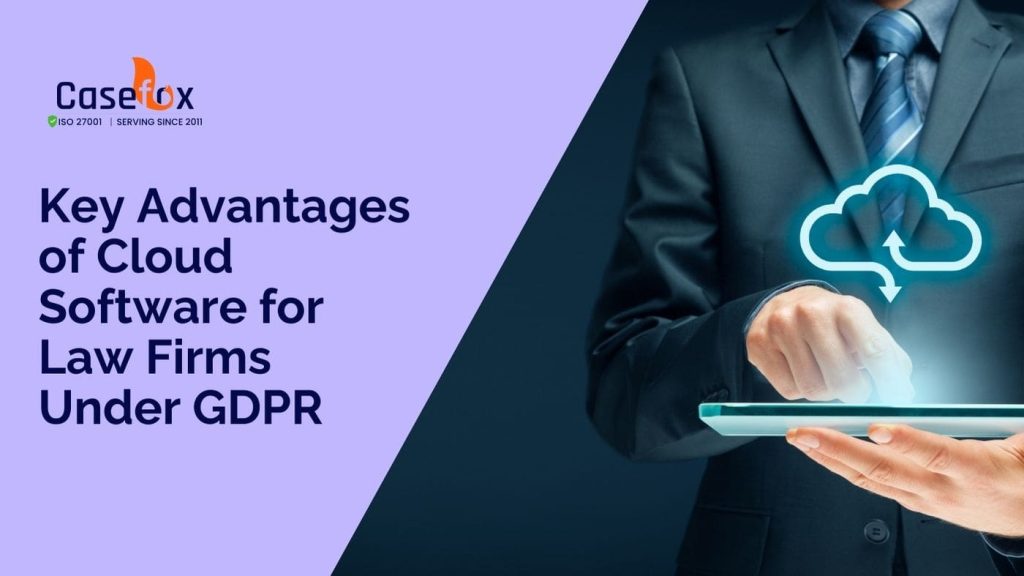Cloud software implementation in law firms has its advantages, especially in data protection and obeying the General Data Protection Regulation (GDPR). Using cloud-based solutions is more effective and convenient, and data can be kept safely. For law firms, it is equally important to comply with the rules on the security of data as stipulated in the GDPRA, as these laws address issues on an individual’s personal information collection, retention, alteration, and dissemination.
Cloud software providers that offer solutions designed for law firms have high-level security features such as encryption, frequent audits, and strict limiting of access to confidential data to GDPR-compliant levels to ensure client information is safeguarded as required. This makes the use of cloud software very convenient for law firms that want to improve their efficiency without compromising the confidentiality of their client’s information.
3 Ways the Cloud Can Enhance GDPR Compliance for Lawyers
For your law office, keeping up with GDPR standards can be tough. You have to demonstrate the necessity of data collection and obtain a client’s permission to use their data. Furthermore, it is important to make sure that you have documentation of what data you hold, why you hold it, and how it can be retrieved securely.
The good news is that cloud-based legal software can enhance your compliance process with little hassle and worry. Here are three crucial advantages of employing such software in your law’s compliance with GDPR.
Secure Data Storage Solutions

Data management is an important factor in legal practitioner’s compliance. Firms are expected to have in place effective backup plans necessary for preventing undue loss of sensitive information in situations such as fires, stealing, or technical failures.
A dedicated server is not only vulnerable to such physical occurrences but also makes the organization prone to information losses. When all client information is stored within a single unit, there is a possibility of the entire client information database getting lost because of destruction or intrusion.
On the flip side, some programs offer better security details where all files are usually kept in the cloud. Data does not have to be stored in a single location and rather it can be stored in several places or multiple servers for easy access. This provides better security for sensitive client information.
As the firm grows, cloud software solutions also allow more storage of data than before. With the constantly changing dimensions of cloud-based documents, more and more client information will need to be managed and protected, which in turn will require more storage. As for cloud-based software, firms do not have to prepare to spend more funds on storage space as the company grows. The program adapts to the firm’s strategies while building the way for more client data to be available and at the hands of the firm whenever needed.
Cloud Security for Law Firm
A critical component of your organization’s data management and data storage activities is to ensure that you uphold your client’s confidentiality. There are policies in place according to the GDPR that aim to protect the individual’s data. However, in-house and cloud-based solutions are inherently different by nature for data protection, and one must appreciate these distinctions before choosing which one to adopt.
Finished with the onsite implementation of providers? Cloud-based solutions take advantage of other dedicated servers hosted at data centers run by the provider. To safeguard data while in transit or stored, cloud providers have adopted several security techniques, including encryption, access restrictions, and firewalls. Encryption helps prevent unauthorized access to the information, even in instances of security breaches.
Compliances Support Services

Furthermore, your provider of cloud-based legal software can assist in the process of complying with GDPR requirements. This is particularly crucial where time-sensitive access to case files, especially where system hitches could delay critical case information, leading to interruptions in the workings of the firm.
Such a support system can be reassuring to law companies 24/7, in that as long as there is a phone or an email, there is guaranteed assistance whenever the need arises. This greatly decreases the downtime and helps in the running of the firm.
Conclusion
Working in the law sector, your company is required to adhere to the GDPR standards. It is part of the legal profession to have access to the client’s personal information touch, which should be secured and stored. Principally, law firms should put in a lot of effort so that the trust of the people and their reputations are not ruined by a failure to keep their client’s information safe and secure. Cloud-based legal software assists law clinics to lessen the amount of resources, time, and labor needed to ensure that GDPR procedures are followed. Such solutions provide for the storage, management, and retrieval of all such data from one place, making it easier to document the legal reason for the data collection and its usage. Besides, cloud service providers apply various measures like security and accessibility on the data during transfer and when the data is not being used.

